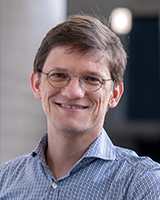Selim Jochim Receives ERC Consolidator Grant
7 March 2017

Photo: Schwerdt
Heidelberg researcher Prof. Dr Selim Jochim has received a prestigious ERC Consolidator Grant for excellent young researchers from the European Research Council (ERC). The funds will be used to support a research project in the field of quantum physics. The project's aim is to assemble many-body systems from familiar components and thus simulate the properties of complex quantum systems. The ERC will provide approximately two million euros in funding for a five-year period. Prof. Jochim teaches at the Institute for Physics at Heidelberg University. In 2011, the physicist was the recipient of an ERC Starting Grant.
According to Prof. Jochim, one of the main areas of research in physics is understanding the complex interplay of many particles. Of particular interest is how microscopic interactions produce the specific properties of matter. A particularly simple example for this is the long-resolved question on how the motion of gas molecules leads to observed quantities like pressure and temperature. In quantum mechanical many body systems, this question is usually related to the motion of electrons in a solid, which is simulated here using neutral atoms. In their experiments, Jochim and his team of researchers are working with ultracold lithium atoms. They have already succeeded in creating the fundamental building blocks that are needed to simulate such many-body systems.
In the ERC-funded “Quantum State Assembler” project, the Heidelberg researchers intend to use these building blocks to assemble systems with widely tunable properties. Using this “quantum simulation”, they will investigate physical systems whose properties are otherwise very difficult to predict. "We hope to contribute to the understanding of effects that have yet to be explained, such as high-temperature superconductivity," states Prof. Jochim. "We may also be able to discover related but completely new phenomena in this way."
Selim Jochim (b. 1975) studied physics at Heidelberg University, the University of California in Berkeley and San Francisco State University. He earned his doctorate in 2004 at the University of Innsbruck, Austria for his dissertation on the Bose-Einstein condensate. He pursued postdoctoral research at the IBM Research Laboratory in Zürich, Switzerland and the University of Chicago in the US. In cooperation with Heidelberg University, the researcher was a Junior Professor at the Max Planck Institute for Nuclear Physics from 2006 to 2009. He has been a professor of experimental physics at the Institute for Physics at Ruperto Carola since 2009.
The Consolidator Grant is given to promising researchers whose own independent working group is in the consolidation phase. Scientific excellence is the main criterion.

